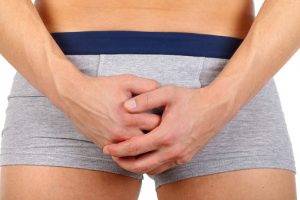
Although an enlarged prostate commonly affects older men, men of all ages are prone to prostatitis, with 25 percent of hospital visits accounting for younger and middle-aged men.
There are three main types of prostatitis: acute bacterial prostatitis, chronic bacterial prostatitis, and chronic nonbacterial prostatitis. Acute bacterial prostatitis is a bacterial infection, which causes inflammation that is typically uncommon but comes with severe symptoms. Chronic bacterial prostatitis occurs from recurrent urinary tract infections that enter the prostate gland. Symptoms may be similar to acute bacterial prostatitis but less severe and fluctuating. Lastly, chronic nonbacterial prostatitis is the most common form of prostatitis that presents urinary and pelvic pain for at least three to six months.
Prostatitis causes and risk factors
Prostatitis can be caused by bacteria entering the prostate gland from the urinary tract or from a sexually transmitted disease, specifically gonorrhea, chlamydia, or HIV. E. coli is also a common bacterium that can cause UTIs, which may lead to prostatitis.
Risk factors for prostatitis include a prior history of prostatitis, developing a UTI, use of a catheter or other urologic procedures, an enlarged prostate gland, engaging in anal intercourse, having a structural or functional urinary tract abnormality, dehydration, and local pelvic trauma.
Prostatitis signs and symptoms
Signs and symptoms of prostatitis can range in severity and occurrence. The most common symptoms include discomfort, pain, or aching in testicles or the area between the testicles, discomfort or pain in the lower abdomen, urinary urgency or frequency, pain or stinging sensation during urination, feeling as if you are sitting on a golf ball, lack of libido, and difficulty getting or maintaining an erection.
- Pain or burning sensation during urination (dysuria)
- Difficulty urinating (dribbling or stop/starting of urine)
- Increased frequency of night time urination (nocturia)
- Urgency of urination
- Cloudy appearing urine
- Blood in the urine
- Pain in lower back, groin, or abdomen
- Pain in the area between the scrotum and rectum (perineum)
- Pain or discomfort of the penis or testicles
- Painful ejaculation
- Flu-like symptoms (with bacterial prostatitis)
Prostatitis diagnosis and treatment options
If you detect any symptoms of prostatitis or your doctor suspects you have the condition, you will be referred to a urologist who can confirm the diagnosis. As a patient, you will undergo a thorough physical exam to rule out other causes of an inflamed prostate. Furthermore, the urologist will have you complete urine collection so they can examine your urine.
There are many different treatment options for prostatitis depending on the cause. For example, if the cause of prostatitis is bacterial, your doctor will prescribe antibiotics. Other treatment options include alpha blockers, anti-inflammatory agents, prostate massage, and other treatments currently being studied such as heat therapy or drugs with specific plant ingredients.
Treat prostatitis naturally with home remedies
There are home remedies you can utilize to further help treat prostatitis:
- Drink a mixture of goldenseal herb
- Consume tomatoes on a regular basis
- Drink plenty of water
- Soak sesames overnight and chew on them in the morning
- Drink vegetable juices that contain celery, carrot, and spinach
- Take a horsetail herb supplement for a short period of time
- Consume red grapes and other fruits regularly
- Consume watermelon seeds or have them in powder form
- Take over-the-counter pain relievers
- Consume plenty of higher fiber foods
- Be physically active, as sitting for prolonged periods of time can worsen symptoms
- Avoid alcohol, caffeine, and spicy foods as symptoms may worsen
- Control your stress and anxiety, as those may worsen your symptoms too
By sticking to the plan your doctor has put you on, along with these home remedies, you can have much success in treating prostatitis.
Related: Avoid these 4 foods for a healthier prostate